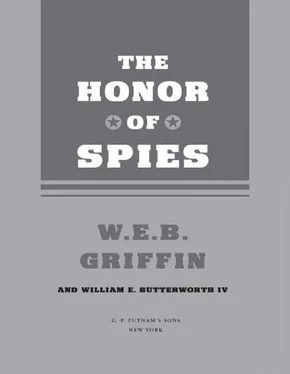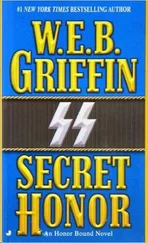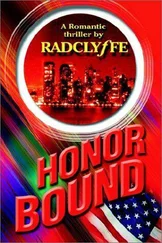W. IV - Honor Bound 05 - The Honor of Spies
Здесь есть возможность читать онлайн «W. IV - Honor Bound 05 - The Honor of Spies» весь текст электронной книги совершенно бесплатно (целиком полную версию без сокращений). В некоторых случаях можно слушать аудио, скачать через торрент в формате fb2 и присутствует краткое содержание. Год выпуска: 2009, ISBN: 2009, Издательство: Putnam Pub., Жанр: Старинная литература, на английском языке. Описание произведения, (предисловие) а так же отзывы посетителей доступны на портале библиотеки ЛибКат.
- Название:Honor Bound 05 - The Honor of Spies
- Автор:
- Издательство:Putnam Pub.
- Жанр:
- Год:2009
- ISBN:9780399155666
- Рейтинг книги:4 / 5. Голосов: 1
-
Избранное:Добавить в избранное
- Отзывы:
-
Ваша оценка:
- 80
- 1
- 2
- 3
- 4
- 5
Honor Bound 05 - The Honor of Spies: краткое содержание, описание и аннотация
Предлагаем к чтению аннотацию, описание, краткое содержание или предисловие (зависит от того, что написал сам автор книги «Honor Bound 05 - The Honor of Spies»). Если вы не нашли необходимую информацию о книге — напишите в комментариях, мы постараемся отыскать её.
Honor Bound 05 - The Honor of Spies — читать онлайн бесплатно полную книгу (весь текст) целиком
Ниже представлен текст книги, разбитый по страницам. Система сохранения места последней прочитанной страницы, позволяет с удобством читать онлайн бесплатно книгу «Honor Bound 05 - The Honor of Spies», без необходимости каждый раз заново искать на чём Вы остановились. Поставьте закладку, и сможете в любой момент перейти на страницу, на которой закончили чтение.
Интервал:
Закладка:
"Such behavior, such disloyalty, could not be tolerated, of course. The first thing FDR did was tell the Air Corps they were not to call Colonel Lindbergh to active duty under any circumstances. Lindbergh then continued to work for Juan Trippe at Pan American Airways.
"This directed Roosevelt's anger to Trippe. 'How dare someone give employment to a scoundrel like Lucky Lindy?' Trippe was told to fire him. He objected, and I understand there was a nasty scene before Trippe finally gave in to FDR's wrath.
"Lindbergh then went to work for Lockheed.
"But Roosevelt was not finished with Trippe. How to punish the owner of an airline? By starting up another airline to compete with him. Where? What about Argentina? We have--that's the regal 'we,' of course--the OSS down there, right? So FDR summons Wild Bill Donovan and tells him to have the OSS start up an airline; he will see the aircraft are provided.
"Donovan thought the idea was insane. And so did I when I heard about it. But Donovan knew better than to make an issue of it. Both of us are aware of the dangers of arguing with Roosevelt--which, incidentally, since we are making you privy to things you shouldn't know, have grown more dangerous since FDR's health is failing--so we arranged to have airplanes sent to Argentina and told you to set up an airline.
"At that time--as I didn't want what I considered to be the airline nonsense to interfere with the other things you are doing down there--I told you there would be no OSS connection to your airline. But then . . ."
Graham paused and gestured for Dulles to pick up the narrative.
Dulles nodded and said, "Alex and I had rather urgent matters to discuss; we arranged to meet at an airfield in Newfoundland. Alex showed up in a Constellation flown by our mutual friend Howard. I had never seen one, nor knew anything of its capabilities. Once they had been explained to me, we decided that Constellations could be very useful to us."
Graham picked up the narrative again: "If I had gone to General Arnold and asked for Constellations for the OSS, he probably would have laughed at me. But Donovan could see their potential value. So he went to FDR and very skillfully suggested that the way to really stick it to Juan Trippe was to provide the airline we already had in Argentina with aircraft with which they could fly all over South America--Constellations--and possibly even establish service across the Atlantic.
"Roosevelt was enchanted with the idea. So you got your Constellations."
"And what am I supposed to do with them?" Frade asked.
"So far as Donovan and Roosevelt are concerned, all you are doing, so to speak, is rubbing Juan Trippe's nose in the mud. SAA is flying scheduled service between South America and Europe; Pan American is not. When the war is over, SAA will have a tremendous advantage over Pan American."
"And as far as you two are concerned?" Frade asked.
"That's what Colonel Graham has wisely changed his mind about telling you," Dulles said. "Recognizing not only that you do, in fact, have the Need to Know, but that it would not be wise to keep you in the dark."
"About what? You're implying that Donovan doesn't know."
"Unfortunately," Dulles said, "we simply can't take the risk of having what you're going to do get out. And it would get out if Donovan were privy to it."
"Which is?" Frade asked.
"Immediately, what we're going to do . . . ," Graham said, then stopped. "This is the business to which I didn't think you should be privy. It was my intention that you would know nothing about this. But Mr. Dulles disagreed . . ."
Dulles nodded.
". . . and," Graham went on, "I have deferred to what I really hope is his superior wisdom; we are 'agreed' to tell you. The German officer in charge of Abwehr Ost--Russian--intelligence is a lieutenant colonel by the name of Reinhard Gehlen. He is far more powerful than his rank suggests. He is vouched for by Admiral Canaris, and, like Canaris, is involved in Operation Valkyrie."
Frade considered that, then nodded.
"A delegate of Canaris," Dulles carried on, "came to us--right here in this hotel, as a matter of fact--with an interesting offer. Gehlen recognizes the war is lost; that it's just a matter of time. And a relatively short one, if Valkyrie succeeds and Hitler is removed. God only knows how long if Valkyrie fails and Hitler fights to the last member of the Hitler Youth, which he is entirely capable of doing.
"Anyway, Gehlen is willing to turn over to us all his assets, data, and--very important--agents-in-place. He has two reasons. He personally doesn't want to fall into Russian hands. More important, he doesn't want his family to fall into Russian hands."
"In other words," Frade said, "he's covering his ass and wants to set up his own private Operation Phoenix?"
"You could put it that way, I suppose," Dulles said. "But it's not black and white. In our way of life, things are seldom simple."
"His second reason," Graham went on, "is that he believes the United States will ultimately, inevitably, go to war with the Soviet Union--"
"So does my grandfather," Clete said.
"--in which case his information and especially the agents-in-place would be of great value," Graham finished.
"Do you think we're going to have a war with the Russians?" Clete asked softly.
"I don't think the possibility can be dismissed out of hand," Dulles said. "There are a number of knowledgeable people--General George Patton among them--who think we will."
"Among other things that Canaris's delegate offered to give us--in fact, did give us--are the names of Soviet spies in the Manhattan Project," Graham said.
"The Russians know about that atomic bomb?" Frade asked, his surprise showing.
Dulles nodded. "And are trying very hard to steal it for Mother Russia."
"Jesus Christ!"
"What Gehlen and Canaris want is for us to provide sanctuary for their men--and the families of their men--in South America."
"To which they will be flown, via Lisbon, by South American Airways?" Frade asked.
Dulles said, "There are two problems here with which I think you should be made familiar. Colonel Graham is--understandably--uncomfortable with you being aware of them."
"Which are?"
"Colonel Donovan and, of course, the President," Dulles said. "Perhaps I should have said, 'The President and, of course, Colonel Donovan.' "
Graham said, "What we should have done when Canaris made us this offer was refer it to Colonel Donovan. If we had done that, the chances are that Donovan would have gone to Roosevelt, strongly recommending that we make the deal. And the chances are that Roosevelt would have gone along with it."
"But you didn't go to Donovan with it?" Frade asked incredulously. "Is that what you're saying?"
Both Graham and Dulles nodded.
"Donovan, we decided, would have gone to Roosevelt," Dulles said, "which meant that others would learn of it. For example, Vice President Henry Wallace. Wallace is a great admirer of Joseph Stalin and the Soviet Union. He would have insisted that Russia, as our ally, has a right to any and all intelligence Gehlen would provide. And the President would have gone along with him; FDR really believes that Stalin can be trusted; more important, that he can control him.
"Mrs. Roosevelt believes both things, that the Soviet Union is a trustworthy ally and that her husband can control Joseph Stalin."
"Then how is it that the Russians 'don't know' about the Manhattan Project, the atomic bomb?" Frade said.
"There's a difference between not having been told about it and not knowing about it," Dulles said. "Of course they know about it. The question then becomes who told them about it, and how much they have been told. Or how successful their espionage has been . . .
Читать дальшеИнтервал:
Закладка:
Похожие книги на «Honor Bound 05 - The Honor of Spies»
Представляем Вашему вниманию похожие книги на «Honor Bound 05 - The Honor of Spies» списком для выбора. Мы отобрали схожую по названию и смыслу литературу в надежде предоставить читателям больше вариантов отыскать новые, интересные, ещё непрочитанные произведения.
Обсуждение, отзывы о книге «Honor Bound 05 - The Honor of Spies» и просто собственные мнения читателей. Оставьте ваши комментарии, напишите, что Вы думаете о произведении, его смысле или главных героях. Укажите что конкретно понравилось, а что нет, и почему Вы так считаете.












